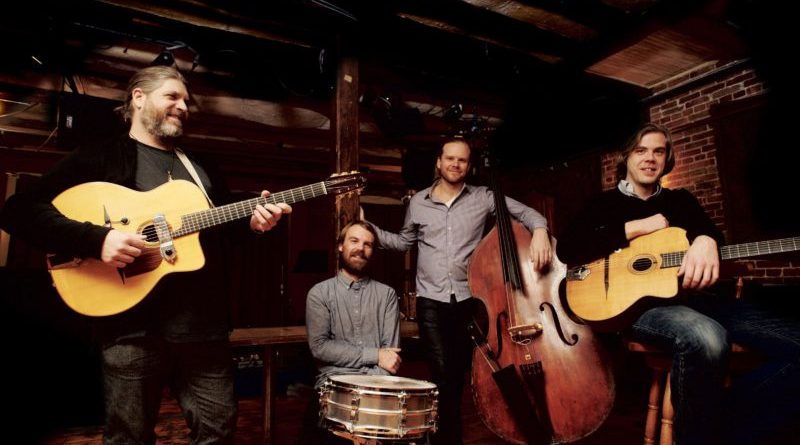INTERVIEW: Guitarists celebrate influence of Django Reinhardt
Photo: Django a Gogo will feature Stephane Wrembel and his band. Photo courtesy of J Elon Goodman / Provided by Cindy Byram PR with permission.
Django a Gogo, the annual festival honoring guitarist Django Reinhardt, stops at the Town Hall in New York City Saturday, April 27. Audience members can expect a full evening of dedicated interpretations of the maestro’s classic compositions.
At the helm of the festival is Stephane Wrembel, who was born in Paris and raised in Fontainebleau, France, home of Reinhardt. He started off playing piano and then transitioned into guitar playing thanks to the influence of his hometown hero.
For Django a Gogo, Wrembel will be joined on stage by a motley variety of guitar experts, including Simba Baumgartner (Reinhardt’s great-grandson), Raphael Fays, David Gastine, Serge Krief, Sons Lior and Ezeckiel Krief. Banjo player Jonny Mizzone and trumpeter Bria Skonberg will serve as special guests.
Wrembel has been a busy man putting all the pieces together.
“I need to contact all of the musicians, decide on the lineup, get the contracts, work on the visas, which takes a lot of work and a lot of time,” Wrembel said in a recent phone interview. “There’s all kinds of things with room rentals, insurance, finding sponsors, designing posters, designing the shows, who is playing what when.”
For Wrembel, 2019 stands out for Django a Gogo because of the presence of Fays in the musicians’ lineup. Fays is a guitarist, who in the 1970s, in his late teen years, was recording Reinhardt’s music — at a time when the maestro’s popularity was not at its highest.
“He kind of reintroduced the music of Django with a newer sound,” Wrembel said. “He can play classical, flamenco, Django. He’s really good. He’s amazing. He’s one of the greatest guitar players I’ve ever witnessed. I’ve never seen anything like that actually, anyone who can play so good in so many different styles.”
Wrembel has been converted to Reinhardt’s mastery for a long time. Growing up in Fontainebleau has that type of influence on a young person.
“This is what we hear,” he said of the music. “It’s like being raised in North Carolina and hearing bluegrass or something like that. When I was 19, I really had a shock, getting into Django as a musician and really paying attention to what was going on. That’s when I started the whole journey.”
Wrembel used the term “irrational” to describe Reinhardt’s unique sound, and that seems entirely appropriate.
“We cannot quantify these things,” he said. “There’s something in this music that just grabs people. … He reaches to classical. He reaches to folk music, the gypsies, flamenco. There’s everything in his music, and I’ve never heard of an artist that generates like that. … You have thousands and thousands of people all over the world who play the Django style. There’s guitar makers who make Django-type guitars. You have Django festivals such as Django a Gogo that goes all over the world with different concepts. I cannot think of one musician that generates that kind of thing — even the Beatles. … Once you start being into Django’s music, you never leave.”
To describe the music, Wrembel prefers not to use the term gypsy jazz. In fact, he prefers not to use any style or genre. Django is simply Django, and that’s it.
“He’s his own man, his own world,” Wrembel said. “Django is to the guitar what [Johann Sebastian] Bach is to the keyboard. If you’re a guitarist, you can know everything from studying Django, and making Django a genre or just copying his stuff and spitting out his stuff, means you don’t understand Django. That’s not what Django is. That’s not what he was doing.”
He added: “He found something really to do with the nature of the guitar, just following the guitar from its foundation. Like whatever you do, if you get closer to the foundation of the guitar, to the true nature of the guitar, you’re going to come closer to Django. You might as well study Django and learn the nature of the guitar from him. That’s maybe what happens. It’s not really a genre. It’s not really about the man. It’s about the nature of the guitar. It’s like Bach; he wrote stuff for the keyboard. It’s the nature of the keyboard. It’s the nature of the piano. Whatever style you play, whatever you do, if you practice Bach on the piano, your piano is going to get better. That’s it.”
By John Soltes / Publisher / John@HollywoodSoapbox.com
Django a Gogo will play Saturday, April 27 at the Town Hall in New York City. Click here for more information and tickets.

